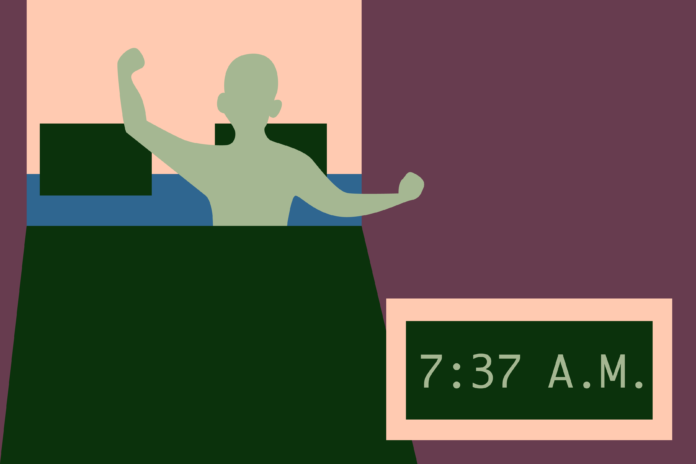Negative health implications go beyond just a lost hour of sleep
By LILLY ACKERMAN — science@theaggie.org
Every year, the clocks “spring forward” in March for most of the United States, giving us later sunsets until we “fall backward” in November. However, this comes at the price of one hour of sleep and misalignment with the morning light — penalties that actually have some serious effects on human health and well-being.
Dr. Heinrich Gompf, a sleep medicine researcher in UC Davis Health’s Department of Neurological Surgery, explained that daylight saving time was originally put in place to conserve energy during World War I and II. By extending daylight later into the evening times, people would use less electricity when they got home from work, allowing more of this energy to be used for war resources.
We still follow this annual system today, but sleep researchers have found that it has negative effects on our circadian rhythms and thus our health. This has led to questions about whether it is worth continuing, especially since energy efficiency has improved drastically since daylight saving time’s inception.
“All organisms have an internal timekeeping mechanism known as the circadian clock which runs an approximately 24-hour rhythm of gradually increasing and decreasing hormone levels,” Gompf said via email. “This approximate clock needs to get reset every morning with light […] But when we change our clocks to daylight savings time in the spring, that light cue isn’t there.”
According to Temitayo Oyegbile-Chidi, a neurologist specializing in childhood and adult sleep disorders and an associate professor of neurology at UC Davis Health, a misaligned circadian rhythm can negatively affect human health in a variety of ways.
“[D]uring the first week of change to daylight saving time, there are more motor vehicle accidents, especially in the morning, more strokes and heart attacks and more complaints of sleep problems amongst people than any other time of the year,” Oyegbile-Chidi said via email.
Researchers have even seen relief from these effects when we “fall backward” in autumn, suggesting that there is a chronic de-synchronization for the entire duration of daylight saving time.
“I’m sure you have noticed that during daylight saving period, you may go out and stay out later, eat later, watch TV later, etc.,” Oyegbile-Chidi said. “All these activities misalign with the natural body clock which expects more sunlight in the early morning instead of the late evening. There is evidence that this misalignment over time may contribute to other health issues including cancers and metabolic disorders such as diabetes.”
Luckily, there are ways to minimize these negative effects for a better experience navigating the time change.
“The best thing to do is to get as much natural, outdoor light as possible, as early in the day following the clock change as you can,” Gompf said. “Otherwise […] [another way] is to eat only a very light meal for dinner the evening before the clock change. This will then help you be hungry enough to have your first meal of the day after the clock change—for most people that’s breakfast, but for some it’s lunch—an hour earlier.”
Oyegbile-Chidi also recommended to shift your sleep 10 to 15 minutes every day for the week leading up to the time change as a way to ease into the new schedule.
Ultimately, due to the health implications it has and the difficult adjustment it brings, both Gompf and Oyegbile-Chidi, along with the National Sleep Foundation and other national sleep organizations, recommend that we move away from the time change in the future.
“Given the negative health effects of changing the clock, it is now no longer worth it,” Gompf said. “The Sleep Research Society, which I am part of, as well as all other major sleep and medical associations recommend not changing the clock anymore.”
Although those extra long summer nights would be missed, our bodies would thank us in both the short- and long-term if daylight saving time ended for good. In the meantime, the recommendations above might alleviate some of the annual strain.
Written by: Lilly Ackerman — science@theaggie.org



